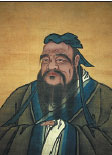Who was Confucius?
"Confucius" (551-479 BC) is the Latinized version of Kong Fuzi, or "Master Kong".
His real name was Kong Qiu, and he lived during the Spring and Autumn Period (770-476 BC) when the Zhou kingdom had disintegrated into many de facto independent feudal states which were subject to the Zhou kings in theory only.
Like many other members of the educated elite, Confucius traveled widely among the states, offering his services as a political advisor and official to feudal rulers and teaching to earn a living.
Although his career as a petty bureaucrat was unsuccessful, Confucius left his mark as a teacher and philosopher. A few generations after Confucius' death, first- and second-generation students collected accounts of his teachings and philosophical musings to form the basis of his most famous work, which is widely known in English as The Analects.
In his work, Confucius argued strongly in favor of family loyalty, that children should respect their elders and wives respect their husbands, and that good people should worship their ancestors. From this base, he further propounded his belief that the family unit was the perfect template for successful government.
While many people in China regard Confucianism as a quasi-religion, scholars are divided: some believe that the values he espoused were too secular to allow them to harbor religious undertones, while others argue that the secular nature of his work overshadows the fact that it contains many religious themes. Some academics argue that although Confucius discusses the afterlife and speaks vaguely of a place that could be interpreted as a form of heaven, he rarely talks about spirituality in the accepted modern sense.

(China Daily 07/20/2016 page6)

 Shandong Culture and Tourism Consumption Season
Shandong Culture and Tourism Consumption Season Culture, tourism sectors pick up in Shandong as epidemic wanes
Culture, tourism sectors pick up in Shandong as epidemic wanes

